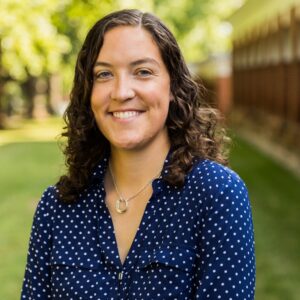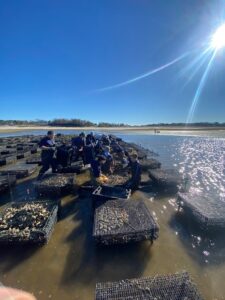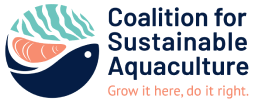The Coalition for Sustainable Aquaculture is proud to uplift the voices of our Future Leaders in this blog series: Meet a Future Leader. In this series we will interview the members of CSA that are Future Leaders set to make waves in aquaculture. We’ll learn what inspires them, what they hope to contribute to the world of aquaculture, and why they advocate for sustainable aquaculture.
Say hello to Hannah Crosby, a master’s student at the University of Virginia.
Can you tell us about yourself and how you were introduced to aquaculture?

My name is Hannah Crosby, and I am about to graduate with my Master’s in Public Policy from the University of Virginia after which I hope to work in the world of ocean conservation and policy. Prior to graduate school, I served with AmeriCorps Cape Cod which was my introduction to the world of aquaculture. AmeriCorps Cape Cod is an 11-month service term dedicated to promoting and protecting Cape Cod’s fragile ecosystem through environmental service projects.
Aquaculture is an important aspect of the Cape Cod ecosystem and economy, so through that program I was able to work with a variety of shellfish departments across the Cape. I primarily worked on local town plots that grew quahogs and oysters and assisted at all stages of the growing process including seeding, sorting, laying nets, and farming the oysters.
I did not grow up on the ocean, so to live and work on Cape Cod—an area inextricably linked to the water—gave me a real appreciation for the role that aquaculture and shellfishing plays in many coastal communities. On a less serious note, I also think shellfishing is fun! Being outside, working with the tides, and watching the early morning and late afternoon light on the flats of Cape Cod Bay is a spectacular way to spend a day. If AmeriCorps taught me nothing else, it taught me that every activity is more fun when you’re wearing a pair of waders.
What excites you about aquaculture and why do you joined CSA?
Through an internship with Environmental Defense Fund last summer, I was introduced to the policy side of aquaculture, specifically the opportunities present in the offshore aquaculture space. Offshore aquaculture and growing sustainably sourced seafood is fundamentally a food issue. I was shocked to learn this summer that the U.S. imports 90% of it’s seafood. I think the U.S. can—and should—change that. As the population and demand for sustainably sourced seafood increase, establishing robust, science-based open ocean aquaculture policy in the United States can help fill this gap. With climate change impacting other food sources and seafood demand rising, the U.S. has the opportunity to be a leader in sustainably sourced seafood.
In my graduate studies, my policy classes have focused a lot on the value of coalition building and engaging diverse stakeholders as a way to create lasting policy change. One thing I value about CSA is their emphasis on bringing together a diverse coalition of chefs, industry experts, and environmental advocates. Each group brings a different—and valuable—skillset to the table, and I believe that will pay dividends in the long-term for ensuring robust, science-based aquaculture policy is established in the U.S.
What would you like decision-makers to know about seafood and aquaculture, particularly the SEAfood Act?

Since the United States lacks a comprehensive federal regulatory framework around offshore aquaculture, the bipartisan SEAfood Act that CSA is championing has the potential to lead substantive policy change. It is rare that legislators and decision-makers get to shape policy from the ground up, so the SEAfood Act provides a unique opportunity to ensure the United States establishes robust aquaculture policy from the outset.
As climate impacts continue to disrupt food systems and the demand for seafood grows, comprehensive aquaculture policy in the U.S., such as the SEAfood Act, has the ability to ensure that locally and sustainably sourced seafood can meet these demands. The SEAfood Act fully embodies CSA’s mission of building out sustainably sourced seafood in the U.S. by “building it here and doing it right.”
